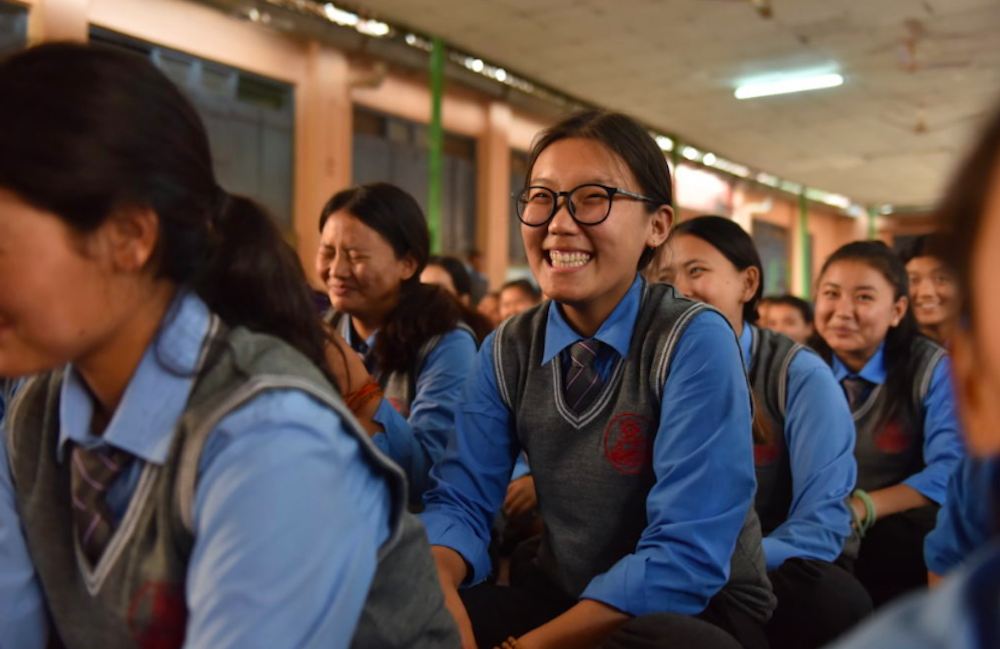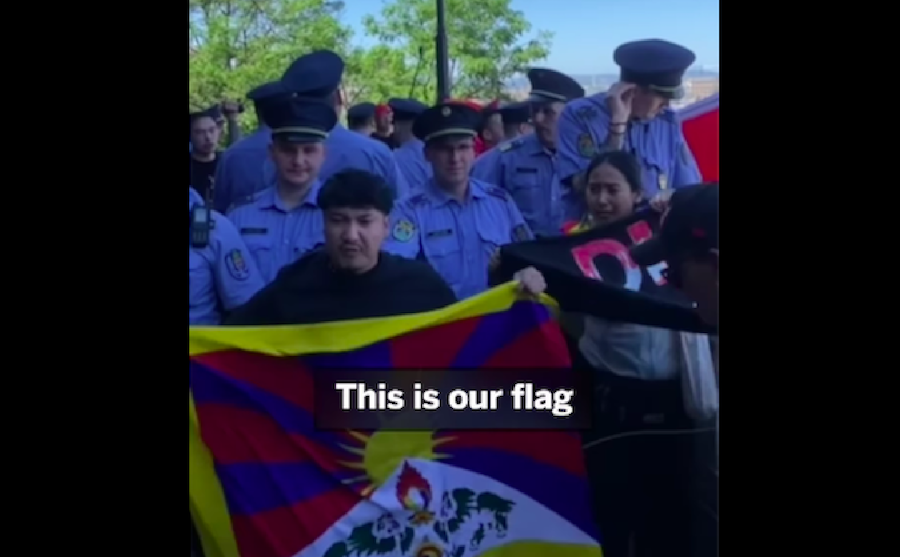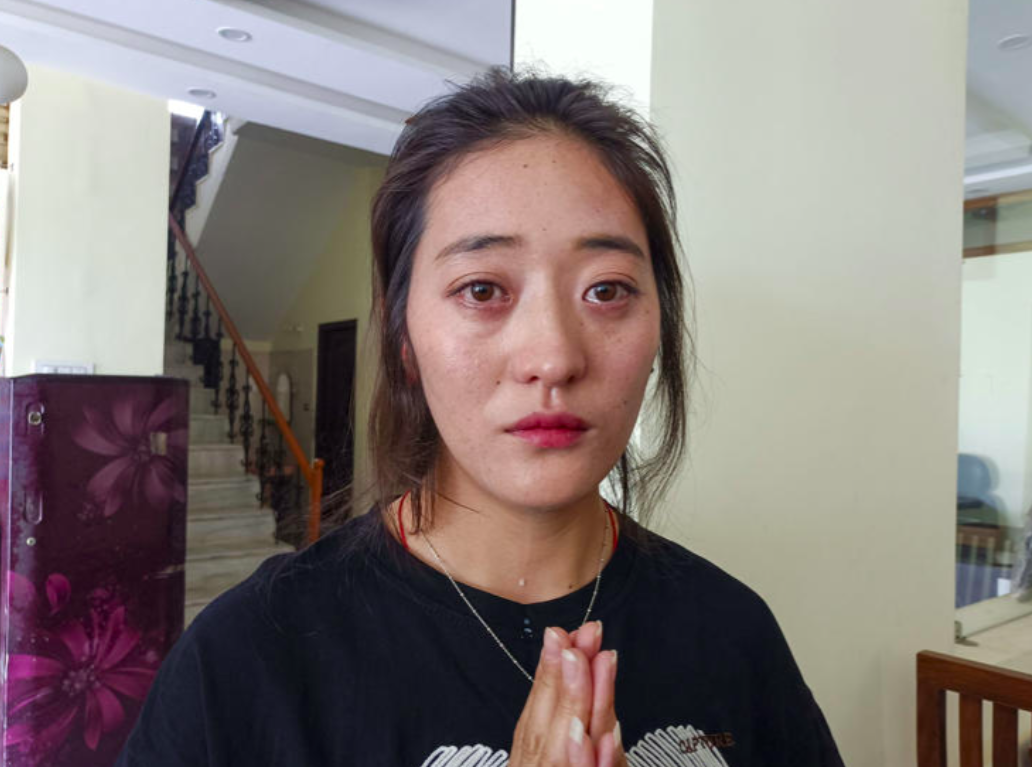By Tsering Kyi
Translated by Dhondup Tashi Rekjong and Tenzin Dickyi
I was sleeping in on Saturday morning when my cell phone rang several times. I picked it up without looking at the number. Over the phone I heard crying and the sounds of protest and the local dialect of my town Amchok: “Boys, don’t be sad, be strong, walk this way, walk forward. Om mani padme hum, Gyalwa Tenzin Gyatso.” No one was talking to me over the phone and I realized that something bad had happened. I quickly called the other villagers who said, “I am sorry your brother’s lovely son has passed away.” I didn’t understand and asked them again, “What happened?” The reply was, “Your brother Dukar Kyab’s son set himself on fire on Amchok street today around 2pm.”
How did the idea come to this humble and decent boy? A few days back, when I was talking with my brother on the phone, my nephew was also there and he said, “Father, when you finish talking with Sister Kaka, please hand the phone to me. I have something to tell her.” When I spoke with him, he didn’t have anything special to say and he said, “How are you these days? I see you often on TV but your hair is pulled back so that your face looks like a moon. Don’t you have any nice Tibetan chupas to wear?” I jokingly told him that if he went to Kachigar (Chi: Linxia) later, he should make some chupas for me. This was my last conversation with the nephew I hadn’t met for many years.
My brother Dukar Kyab and his wife Tsering Dolma have three kids, a son named Tsering Tashi and two daughters named Tamdrin Tso and Tsethar Kyi. The two girls have left home as brides, so at home the couple have their son Tsering Tashi and his bride Yumtso Kyi. Previously, when I talked or wrote about the self-immolations for the media, it was hard to get the smallest bit of information about the real difficulties faced by the self-immolators’ families, but today, when it happened in my family, and I could hear the cries and lament, the loss and suffering of each person over the phone, it is hard to hold in the agony of seeing the body of a beloved who has burned himself alive.
A herdsman who knew Tsering Tashi said that that morning, Tsering Tashi was with them herding the yak and the sheep but he said that he had to go home and asked them to look after his animals. When he reached home, he asked his mother, “I will wear my Tibetan chupa today. Which one is better?” His mother replied, “It’s quite cold today so wear the thick chupa.” She said he wore the thick chupa and left after the animals. He then returned to his fellow herdsmen who reported that he said, “I have an important work in town. I’ll be right back.” In the fold of his chupa, there was something large but they didn’t know what it was. They said that he also switched off his cell phone.
An official of the Chinese government who saw the whole event of the immolation in Amchok town said, “A Tibetan wearing a chupa, in flames of fire surrounding his wire-chained body, shouted “Ki hi hi! Gyalwa Tenzin Gyatso” in front of the town hospital and then fell to the ground without finishing the phrase. He got up again and ran on the street. At the intersection, he saw the army and police making rounds as usual and started walking away. He fell on the ground again and after about five minutes, he passed away. The Tibetans on the street were shocked at first. Then when the police came near the self-immolator, people threw stones at them, and the police and army stayed at a distance.”
My family said they were told that a man had self-immolated and passed away, and that the man appeared to be their son Tsering Tashi and someone must come to identity him. My brother went. Even though he couldn’t bear to look and the body had become difficult to recognize, he identified his son by the shape of his face. The Tibetans in the town prepared a car, and surrounded the body, managing to keep the police away. The people were able to bring the body home in a procession.
The police not only stopped the monks from Amchok monastery who were on their way to my brother’s house to pray, but just now when I called home, they had put many police cars on the three main roads going towards Kyi village with the lights flashing at night. Except for the representatives of other villages, they stopped and turned away people who were coming to the village to show solidarity.
An old member of the family said to me, in anger and desperation, “It is really sad that this government is so brutal to us. They ordered us to have a quick funeral, and forget the lama, and threatened that if we didn’t have a quick funeral, whatever happened would be our responsibility. They will do anything. It is very hard for lamas to do anything between the government and the people. We have our Tibetan tradition of when to arrange a funeral. We inform the lama, then the monks come to pray, and then we give the ritual feast and make offerings to the monastery in this order, but the police are coming again and again to say we must have the funeral very soon.”
My nephew Tsering Tashi was seven or eight years old when I left Tibet. He used to call me “Acha Kaka” (Sister Kaka). Because I went to school and recited the Tibetan alphabet “Ka, Kha, Gha, Nga”, he called me Sister Kaka as a nickname. Most of the people in my family were quite fierce, but he had a gentle nature unlike everyone else and didn’t talk much. He was never troublesome as a child. My brother Dukar Kyab had only one son, and he became the family’s pet. This small kid who was always following me around everywhere at home became a strong young man, and brought home a lovely young woman called Yumtso Kyi as his wife.
How do I cope with a decent and humble man without any family issues or conflicts suddenly being gone from this world, or with the fact that my beloved nephew, turned into bone and ashes from self-immolation, cannot even be recognized? How do I console his wife who has become a widow, and my brother and his wife whose hands and hearts have become empty? Meanwhile, my brother, different from me, worried about me and said a few meaningful words to me, “Tsepa, don’t worry. I don’t think that the son of my heart died without meaning or reason.” My brother Dukar Kyab is someone who has worked as a village head for several years and an arbiter who solved village disputes.
How can I have the words in my mouth to console the brother like a father who has placed his hopes and rested his heart on someone who became ashes and bones today, the brother who had to identity the body of his dead son whose skin and body burned in fire and could be recognized only from his shape, the brother who has to be strong for a heartbroken mother and a widowed bride? How can I console the brother who, under the tyranny of policemen and army guarding them like dogs, is in the desperate and awful situation of not even being able to have the funeral he wants for his son?
My dear nephew, your Sister Kaka will keep your last words in her heart. Sleep in peace. My dear nephew, whom I haven’t seen for 13 years, now forever separated from me, I still don’t know whether it is a reality or an illusion, the way you left without any attachment to your father, mother and wife. As I have kept you all in my heart for more than 13 years, so I will remember your eyes and voice as you called for your Sister at home, and I will imagine, my beloved nephew, that you go on living.
Tsering Kyi is a Tibetan journalist and writer. This piece was originally published in Tibetan at Khabdha.com. A version of this piece appeared in the Washington Post online on January 29th, 2013.
[OPINION-DISCLAIMER]









